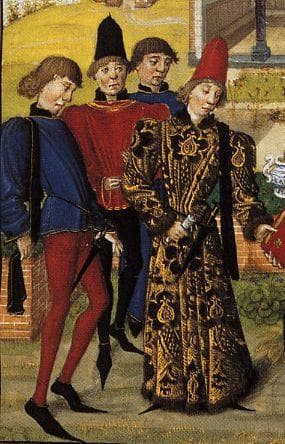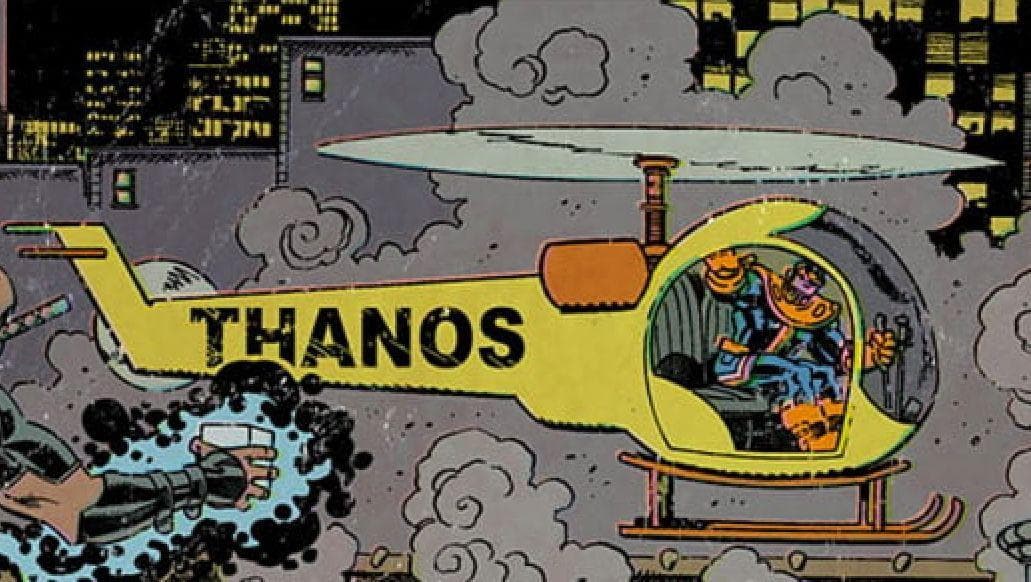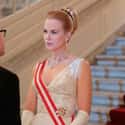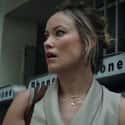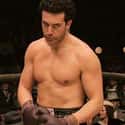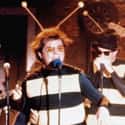-
(#9) The Buddy Holly Story
- Gary Busey, Don Stroud, Charles Martin Smith, William Jordan, Maria Richwine, Conrad Janis, Albert Popwell, Amy Johnston, Jim Beach, John F. Goff, Fred Travalena, Dick O'Neil, Stymie Beard, M.G. Kelly, Paul Mooney, Bill Phillips Murray, Freeman King, Steve Camp, Jody Berry, Robert Christopher, Arch Johnson, Neva Patterson
Executive producer Ed Cohen had many excuses for Buddy Holly's family and friends being upset at his depiction in The Buddy Holly Story, from budget and time constraints to the fact movies can invent their own reality.
"Whatever we put up there on the screen will be the truth," Cohen said. "Ask moviegoers who invented the telephone. They'll tell you that Don Ameche did." This is a reference to the actor, who once played Alexander Graham Bell.
The Buddy Holly Story is based on a book by John Goldrosen, which is not considered an official biography and, according to original Cricket Jerry Allison, the movie got basic facts incorrect. Allison says that the movie suggests the Crickets was a 12-person band when, in fact, "there weren't 12 Crickets during Buddy's [entire] career."
The movie also shows Holly playing with a full orchestra on his final tour when, in reality, he only recruited three people. The film also implies Holly wrote all his music himself without any help and completely omits Norman Petty, a producer who greatly helped Holly's career.
Holly's family was hurt by the film's implication they held no importance to Holly. "We were disappointed by the movie because it wasn't what we thought it was going to be," Holly's mother, Ella, said. "That church scene [where Buddy and rock and roll are condemned from the pulpit] could never have happened. Buddy was close to his pastor, the Reverend Ben Johnson, and he was a member of the Tabernacle Baptist Church."
While the movie depicts Holly's family as against his musical career and constantly telling him to quit, Holly's parents said this was untrue. "We were behind Buddy 100%," his father recalls. "We were very anxious for him to make a career as a singer. We were his biggest fans."
Although the filmmakers told the family they'd be able to view the script before filming, the filmmakers allegedly never followed through. "They didn't ask us about a thing," Holly's brother Larry claims. "I didn't feel that was my brother up there on the screen. We weren't happy with the movie at all."
-
(#14) Grace of Monaco
- Nicole Kidman, Tim Roth, Paz Vega, Parker Posey, Milo Ventimiglia, Frank Langella, Derek Jacobi, Robert Lindsay, Geraldine Somerville, Jeanne Balibar, Roger Ashton-Griffiths, Nicholas Farrell, Olivier Rabourdin, André Penvern, Pascaline Crêvecoeur
Grace Kelly was a Hollywood star seen in classics like High Noon and Rear Window before she married Prince Rainier III of Monaco in 1956 and retired from acting. This transition in her life became the focus of the 2014 film Grace of Monaco, which stars Nicole Kidman as Kelly.
Not only did producers and director Olivier Dahan publicly fight about the movie, but the royal family of Monaco spoke out against it. "The Princely family does not in any way wish to be associated with this film which reflects no reality and regrets that its history has been misappropriated for purely commercial purposes," they said.
The family claimed their attempts to correct errors in the script were ignored and the trailer for the film "appears to be a farce and confirms the totally fictional nature of this film."
Both Kidman and Dahan brushed off the royal family's claims, insisting the movie was meant to be a work of fiction. "This is not a biopic or a fictionalized documentary of Grace Kelly, but only a small part of her life where she reveals her great humanity as well as her fears, and weaknesses," Kidman said.
"I am an artist," Dahan said, addressing the family's concerns. "I understand their point of view. After all, it is their mother. I do not want to provoke anyone. Only to say that it's cinema."
The family may have felt satisfaction with the film's ultimate fate. After flopping at the Cannes Film Festival, the movie had so many problems that it ended up airing on Lifetime rather than in movie theaters. Original screenwriter Arash Amel was so displeased with what had been done to his work, he live-tweeted throughout the broadcast, writing gems like, "The whole tone of this movie was for some reason Vertigo. Which Grace Kelly was never in."
-
(#6) Kathy Scruggs's Colleagues Were Furious About Her Indecent Proposal In 'Richard Jewell'
Clint Eastwood’s film Richard Jewell professes to tell the true story of a security guard whose life-saving actions during the 1996 Atlanta Olympic Park bombing resulted in Jewell being investigated by the FBI and having his life upended in a public firestorm. Ironically, however, the Atlanta Journal-Constitution ended up blasting the film for its defamation of Kathy Scruggs, a real-life AJC reporter, claiming she was unfairly maligned by the film’s loose interpretation of her character.
In the film, Scruggs (Olivia Wilde) makes an indecent proposal to an FBI agent (Jon Hamm) in exchange for landing a scoop, an event which, according to the AJC (and not directly disputed by Warner Bros.), never actually happened. Kevin Riley, an editor at the AJC, called it “lazy storytelling” and proclaimed “it was very upsetting to see Kathy Scruggs portrayed in a way that demeans not just her work, but the work of the AJC.”
Ron Martz, Scruggs’s longtime colleague at the paper, added, “If they had actually contacted me it might have ruined their idea of what they wanted the story to be.”
An attorney for the paper pointed out, “It is highly ironic that a film purporting to tell a tragic story of how the reputation of an FBI suspect was grievously tarnished appears bent on a path to severely tarnish the reputation of the AJC.”
Warner Bros. responded that the film was “based on a wide range of highly credible source material.” The movie also ends with the disclaimer, “The film is based on actual historical events. Dialogue and certain events and characters contained in the film were created for the purposes of dramatization.”
Wilde passionately defended her portrayal of Scruggs, claiming, “I did a ton of research, I really embraced her dynamic, multidimensional nuanced personality,” and “I think it’s a shame that she has been reduced to one inferred moment in the film.”
-
(#3) Cinderella Man
- Russell Crowe, Renée Zellweger, Paul Giamatti, Craig Bierko, Paddy Considine, Bruce McGill, Ron Canada, David Huband, Connor Price, Ariel Waller, Patrick Louis, Rosemarie DeWitt, Linda Kash, Nicholas Campbell, Gene Pyrz, Matthew G. Taylor, Jake Richards, Fulvio Cecere, Duff MacDonald
The climax of 2005's Cinderella Man features protagonist James J. Braddock (Russell Crowe) fighting and beating Max Baer (Craig Bierko) to become heavyweight champion. While this is an accurate portrayal of what happened in reality, Baer's son Max Baer Jr. took offense at director Ron Howard's depiction of his father.
In the movie, Baer is mean, bloodthirsty, and feels no shame about telling Braddock's wife he'll finish off her husband and then take her as his own wife. Baer Jr. claimed his father's personality was very different than that seen in the movie and was offended he had been turned into a villain. "I have great respect for Ronny Howard," Baer Jr. said. "But he never called me for any factual information about my father. They distorted his character. They didn't have to make him an ogre to make Jimmy Braddock a hero."
Although the film accurately shows Baer wearing a Star of David on his boxing trunks, Baer also took offense to the movie failing to mention he did so to show solidarity with Jewish boxing fans in New York. Many members of the Jewish community believed Baer to be a hero after he fought and beat Max Schmeling, the pride of the Third Reich.
In the movie, Baer brags about how he killed boxer Frankie Campbell in the ring, which helps cement him as the film's swaggering, hateable villain. But that incident was actually hugely traumatic for Baer.
"My father cried about what happened to Frankie Campbell," Baer Jr. remembered. "He had nightmares. He helped put Frankie's children through college."
Others backed up Baer Jr.'s claims about his father's personality, often referring to him as "lovable clown." Lightweight champ Tommy Loughran recalled, "Max was the most misunderstood fighter of them all. He was the nicest guy. He had the heart of a lion."
-
(#10) The Doors
- Val Kilmer, Meg Ryan, Kevin Dillon, Kyle MacLachlan, Frank Whaley, Michael Madsen, Kathleen Quinlan, Michael Wincott, Dennis Burkley, Josh Evans, Paul Williams, Christina Fulton, Crispin Glover, Billy Idol, Charlie Spradling
Reactions from the real Doors members to the depiction of themselves and Jim Morrison in Oliver Stone's 1991 movie, The Doors, vary. Both drummer John Densmore and keyboardist Ray Manzarek realized Stone took liberties with events and sometimes made things more cinematically dramatic.
"I didn't remember all those naked girls running on stage," Densmore said. "If that had happened, I would have stopped playing, my God, and started a relationship!" He shrugged off any conflict with Stone's interpretation, calling the movie "a beautiful impressionistic painting of the times."
Manzarek, however, took offense at the altered facts. "Jim didn't light Pam's closet on fire," he said. "He didn't throw a TV set at me... Jim never quit film school. He graduated from UCLA."
Manzarek felt the movie got Morrison's character wrong. "The film portrays Jim as a violent, drunken fool," he said. "That wasn't Jim. When I walked out of the movie, I thought, 'Geez, who was that jerk?'"
Densmore pointed out the studio denied former film student Manzarek from directing the movie, possibly leading to Manzarek's negative reaction. "Ray was on Oliver so much that I don't know if he was allowed on the set for a while," he remembered. "He was trying to tell Oliver how to make the movie. Mainly Ray wanted it to be about none of the darker side of Jim. Well, that's ludicrous."
Manzarek felt the movie focusing on Morrison's problems detracts from the band's message. "The Doors were about idealism and the '60s' quest for freedom and brotherhood," Manzarek said. "But the film isn't based on love. It's based in madness and chaos. Oliver has made Jim into an agent of destruction."
-
(#7) Wired
- Michael Chiklis, J. T. Walsh, Alex Rocco, Ray Sharkey, Patti D'Arbanville, Lucinda Jenney, Jere Burns
When Bob Woodward wrote the John Belushi biography Wired in 1984, many thought the legendary reporter who helped uncover Watergate would shed new light on the comedian's life. However, when the book was released, both Belushi's family and friends spoke out against the inhuman character Woodward presented in his work.
Members of Belushi's family were so angry, John's brother, Jim, even called Woodward a "c*cksucker." Belushi's wife, Judy, originally hired Woodward to write the book, since she valued his investigative skills and thought he might uncover any hidden facts about the way the police handled her husband's passing. Despite her intentions, Belushi's family and friends accused the book of focusing on his problems with substances and not bothering to examine the talented man behind them.
"I hated Woodward's book because I don't believe he made an honest attempt to understand John, who despite his sometimes gruff exterior was a gentle soul," fellow comedian Al Franken said.
When Woodward's book was made into a film in 1989, the criticism continued. Despite the negative feedback received, bidding rights for the book reportedly reached $2 million. Filmmakers cast the then-unknown Michael Chiklis as Belushi, and the film opens with him waking up in the morgue and running around naked, screaming.
It becomes a sort of meta-tale as it includes Woodward's investigation, gives Belushi a guardian angel friend, and depicts the comedian as a casual bigot. Although it probably has nothing to do with the book's criticism and was judged by its own failures, the movie has a 4% critic rating on Rotten Tomatoes.
Dan Aykroyd called the book "exploitation, pulp trash," and Judy claimed, "The man in Wired is not the man I knew... He was a very likable person. He had a terrific presence, and Woodward missed all that."
New Random Displays Display All By Ranking
About This Tool
Our data comes from Ranker, If you want to participate in the ranking of items displayed on this page, please click here.


